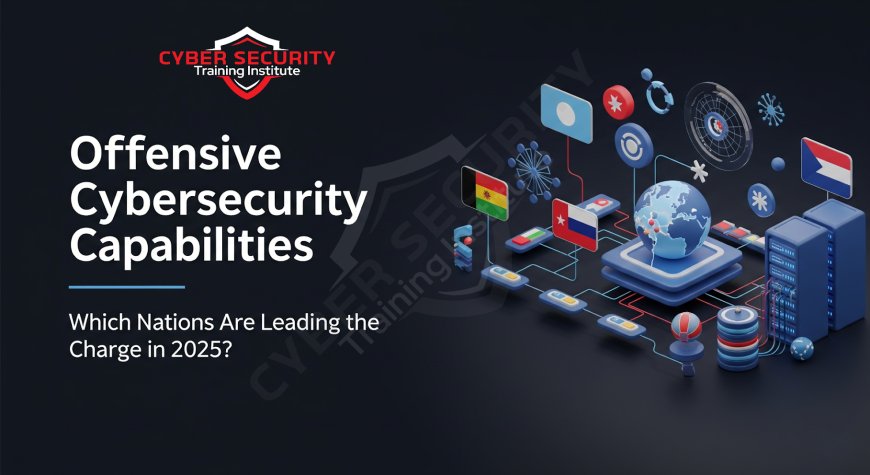Which Nations Are Leading the Charge in Offensive Cybersecurity Capabilities in 2025?
Explore which countries are leading the world in offensive cybersecurity in 2025. This blog dives into national capabilities, advanced AI-driven tactics, and global cyber warfare case studies. Which nations dominate offensive cybersecurity in 2025? Discover the top global cyber powers, their agencies, offensive tactics, and how AI and zero-day exploits fuel international digital conflict.

Table of Contents
- Introduction
- Understanding Offensive Cybersecurity
- Top Nations with Advanced Offensive Cyber Capabilities
- Technologies Fueling Offensive Cyber Power
- Case Studies: Offensive Operations in Action
- Implications on Global Cyber Policy
- Conclusion
- FAQ
Introduction
In 2025, offensive cybersecurity capabilities have become a cornerstone of national defense strategies. While traditional cybersecurity focused on defense, modern nations are increasingly investing in digital offense to deter threats, disrupt hostile infrastructures, and gain geopolitical leverage. This blog explores which nations are leading the charge and how these capabilities are shaping global cyber relations.
Understanding Offensive Cybersecurity
Offensive cybersecurity refers to proactive cyber actions taken to infiltrate, disrupt, or damage the digital infrastructure of adversaries. These include hacking state systems, deploying zero-day exploits, disabling communication channels, and conducting cyber espionage. Unlike defensive measures, offensive operations are often classified and involve advanced nation-state resources.
Top Nations with Advanced Offensive Cyber Capabilities
| Country | Cyber Agency | Key Capabilities | Notable Operations |
|---|---|---|---|
| United States | USCYBERCOM, NSA | AI-driven cyber warfare, global surveillance | SolarWinds retaliation, counter-ransomware ops |
| China | PLA Unit 61398 | Espionage, infrastructure sabotage, AI malware | Attacks on critical infrastructure in Asia |
| Russia | APT28, SVR | Disinformation, system infiltration, ransomware | Ukraine grid hack, US election interference |
| Israel | Unit 8200 | Zero-day development, hardware manipulation | Stuxnet (with US), surveillance of adversaries |
| North Korea | Lazarus Group | Crypto theft, espionage, cyber sabotage | WannaCry, cryptocurrency exchange hacks |
Technologies Fueling Offensive Cyber Power
Advanced technologies are central to modern offensive cyber strategies:
- AI-Powered Exploits: Self-adapting malware and autonomous payloads capable of learning target systems.
- Zero-Day Vulnerability Frameworks: Exclusive access to unpatched system flaws for deep infiltration.
- Quantum Cryptography: Emerging use of quantum systems to break or bypass encryption.
- Deepfake & Synthetic Media: For psychological warfare and misinformation at scale.
Case Studies: Offensive Operations in Action
- SolarWinds Retaliation: In early 2025, the US launched offensive actions against suspected Russian servers using AI-forensics and automated neutralization bots.
- Israeli Recon on Iranian Infrastructure: Cyber agents reportedly disabled command systems in a Tehran power facility without physical access.
- China’s Covert AI Surveillance Network: Deployed in Southeast Asia under the guise of tech cooperation, aimed at siphoning defense communications.
Implications on Global Cyber Policy
As countries scale their offensive cyber power, diplomatic tensions are rising. The lack of a globally accepted cyber warfare framework has made attribution difficult and escalation likely. Cyber arms races are accelerating, with AI, automation, and quantum computing at the forefront. In response, NATO and UN have both proposed collaborative monitoring models, but adoption remains slow.
Conclusion
Offensive cybersecurity is no longer the domain of fiction or elite military units alone. In 2025, it's an integral tool of national influence, deterrence, and warfare. Nations like the US, China, Russia, and Israel are leading in both capability and strategic implementation. As this digital battlefield expands, global governance and ethical boundaries will need to evolve just as quickly to avoid catastrophic miscalculations.
FAQ
What is offensive cybersecurity?
It refers to the use of proactive digital tactics to disrupt or infiltrate adversarial systems and infrastructure.
Which countries are the most advanced in offensive cyber capabilities?
The United States, China, Russia, Israel, and North Korea lead in 2025 with state-sponsored cyber units and AI-powered tools.
Are these offensive operations legal?
Legality depends on international laws and treaties, many of which are still evolving. Most operations occur in legal gray zones.
What is the role of AI in offensive cybersecurity?
AI enables automation, precision targeting, and adaptive malware in offensive cyber missions.
Can small nations have offensive cyber capabilities?
Yes, some smaller nations outsource expertise or work through proxy hacking groups to develop offensive potential.
Has the UN addressed cyber warfare formally?
Yes, but enforcement is limited. Various proposals exist, but consensus on definitions and penalties is lacking.
What are zero-day exploits?
These are vulnerabilities unknown to the software vendor, exploited by attackers before they’re patched.
What makes cyber warfare different from traditional war?
Cyber warfare can be anonymous, low-cost, and global, with effects on critical infrastructure without physical combat.
What is Unit 8200?
It’s Israel’s elite cyber-intelligence unit known for offensive and defensive cybersecurity operations.
What is USCYBERCOM?
The United States Cyber Command, responsible for defending and conducting offensive cyber operations for national defense.
Can offensive cyber actions trigger real-world conflict?
Yes, attacks on critical infrastructure or perceived espionage can escalate diplomatic or military tensions.
What is the Lazarus Group?
A North Korean hacking group involved in cyber theft, sabotage, and cryptocurrency-based attacks.
Is ransomware an offensive cyber tactic?
Yes, when used by nation-states or affiliated groups to target foreign entities for political or financial reasons.
How do nations hide their cyber attacks?
They use proxy groups, obfuscation techniques, and digital false flags to mislead attribution efforts.
Can quantum computing aid in cyber offense?
Potentially, it could crack current encryption, giving nations a massive offensive advantage.
Do offensive cyber attacks require physical access?
No, most are launched remotely, often through phishing, network scanning, or supply chain compromises.
Is deepfake technology used offensively?
Yes, it's used in psychological operations, impersonation of officials, and digital blackmail.
How do countries fund these operations?
Offensive cybersecurity is typically part of national defense budgets, sometimes operating under intelligence agencies.
What are ethical concerns around offensive cybersecurity?
Concerns include collateral damage, civilian data leaks, and escalation into full-blown conflict.
Can the public detect when a cyber war is happening?
Usually not directly, but power outages, banking system disruptions, and leaked data may be signs of cyber conflict.
What's Your Reaction?
 Like
0
Like
0
 Dislike
0
Dislike
0
 Love
0
Love
0
 Funny
0
Funny
0
 Angry
0
Angry
0
 Sad
0
Sad
0
 Wow
0
Wow
0






![How to Install RHEL 10 on VMware/VirtualBox [Tutorial]](https://www.cybersecurityinstitute.in/blog/uploads/images/202509/image_430x256_68b56dc967a4a.jpg)









